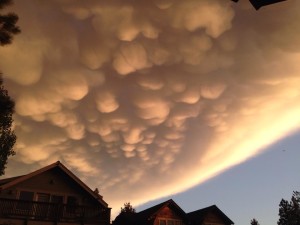
It kind of looks like the ‘mother ship’ has landed.
Or at the least, it seems to be on approach!
That was my thought when Sherry Bergstrom-Byrd whom I know from my Facebook weather page messaged me with this incredible picture from the skies over Bend, Oregon during late spring 2014.
The good news? These clouds usually come in peace!
They are called Mammatus clouds and we rarely see them in the northwest. Their most likely appearance is on a day where thunderstorms have moved through. That was the case with this cloud photo. This particular type of cloud is a sign things are calming down and becoming more peaceful. Even though it looks just the opposite!
How do Mammatus clouds form? In a different way from most other clouds. Most clouds form in rising air. And they vanish in sinking air. This is why areas east of the Cascades mountain range in Oregon and Washington are so much sunnier than western parts of these states. The air rides over the Cascades peaks and then rapidly sinks thousands of feet as it travels to the east. This sinking air dries out–clouds vanish–and it’s sunny in Bend while it’s cloudy in Portland and Salem. Again…
But in the case of Mammatus clouds, the air is sinking but it stays cloudy. That sinking air pushes down to form all these incredible pouches in the cloud. The reason is that in this rare instance, the air is so moist the sinking air at that moment is not enough to dry and air and clear the skies.
I’ve written about other cool looking clouds, too: iridescent clouds, noctilucent clouds and lenticular clouds.
Summer is a great time to spot all of these because the rain clouds and storm systems are gone.
In theory.
If you see great things in our skies this summer, please send them along via Facebook, Twitter (@forecast updates) or by email: bruce@brucesussman.com. In the meantime, happy skywatching!

Great photograph there, Bruce! I’ve seen mammatus clouds like that a few times myself, around this time of year. I used to think they were always associated with severe weather conditions (especially tornadoes), but here on the Pacific coast, usually the most that happens is some gusty winds and showers.